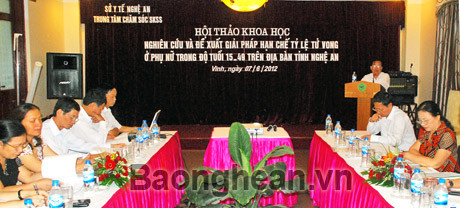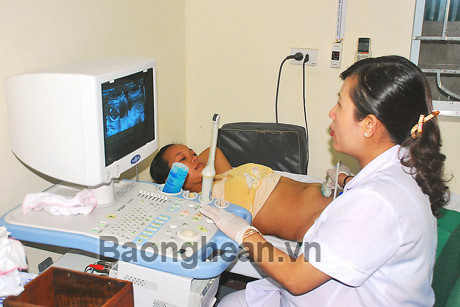Obstetric complications - issues of concern
Nghe An has more than 800,000 women of childbearing age, with more than 45,000 births each year. Nearly 70% of maternal deaths due to obstetric complications occur among women in rural and mountainous areas.
(Baonghean.vn) -Nghe An has more than 800,000 women of childbearing age, with more than 45,000 births each year. Nearly 70% of maternal deaths due to obstetric complications occur among women in rural and mountainous areas.The scientific workshop on research and proposed solutions to limit mortality rate among women aged 15-49 in Nghe An province was recently organized by Nghe An Center for Reproductive Health Care (CSSKSS) with the aim of providing women with knowledge and minimizing obstetric complications.
The topic is headed by Dr. Nguyen Ba Tan - Director of the Provincial Center for Reproductive Health Care; Meritorious Doctor, Dr. Pham Van Thanh - Director of the Department of Health is in charge of the topic.

The obstetrics scientific conference was recently held in Vinh City.
Obstetric complications are one of the biggest risks of death for mothers and newborns. Recently, obstetric complications have occurred in many localities across the country, leading to maternal and child deaths, causing public outrage and concern.
Ms. Le Thi Ngoc Canh (20 years old, in Nghi Xuan, Ha Tinh province) is pregnant for the first time, she has very little knowledge about reproductive health care, especially obstetric complications. With less than 1 month left until she gives birth, she is very worried. Even though she lives in another province, she went to Nghe An Reproductive Health Care Center for a check-up. Ms. Canh said: “This is my first pregnancy so I don't know much about reproductive knowledge, especially obstetric complications, so I am very worried. Through this prenatal check-up, I will follow the advice of the doctors and nurses to hope for a healthy birth and a healthy baby. And next time I am pregnant, I will go for regular check-ups.”

Ultrasound examination of fetus at the Provincial Center for Reproductive Health
Thanks to good communication work, women's awareness of reproductive health care has been greatly improved. Most pregnant mothers go for regular check-ups and pay attention to the instructions of doctors. However, many people still lack knowledge about obstetric complications, leading to disregard. At the Nghe An Reproductive Health Care Center, about 120-150 pregnant women come for check-ups every day, but more than half of them have no knowledge about pregnancy poisoning and obstetric complications prevention.
Talk to us,Ms. Lu Thi Van Anh (Obstetrician, Nghe An Center for Reproductive Health Care) said: Nowadays, pregnant women know how to care about reproductive health and nutrition of the fetus, especially women in cities and towns. However, there are still many people who do not have knowledge and do not care about obstetric complications, mainly women in rural, remote and isolated areas. Meanwhile, the risk of obstetric complications is increasing and becoming more complicated. Therefore, this is also one of the contents we regularly advise pregnant women when they come here for examination.
Through research data of the scientific topic on obstetric complications, it shows that: the main causes leading to pregnancy poisoning and obstetric complications are: too old age when pregnant from 40 or more; giving birth to the third child or more; rarely going to prenatal check-ups; giving birth at home with untrained people to assist; difficult means of transportation, limited awareness of reproductive health care. While obstetric complications can be diagnosed early and have preventable measures, due to subjectivity in many cases, the unfortunate consequences are the death of the mother and fetus.
Nghe An has more than 800,000 women of childbearing age, with more than 45,000 births each year. Nearly 70% of maternal deaths due to obstetric complications occur among women in rural and mountainous areas.
In order for women to have more knowledge and access to reproductive health care services, in addition to the efforts of authorities, especially the health sector, women also need to proactively seek information on reproductive health issues to protect their lives, health and family happiness.
Tu Thanh






